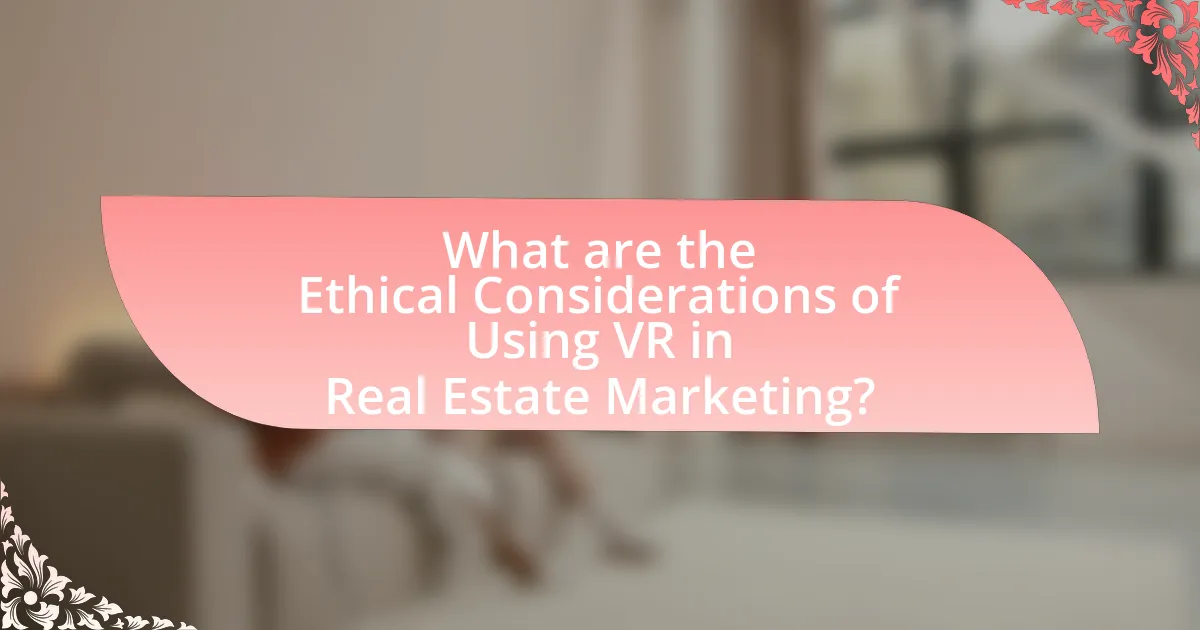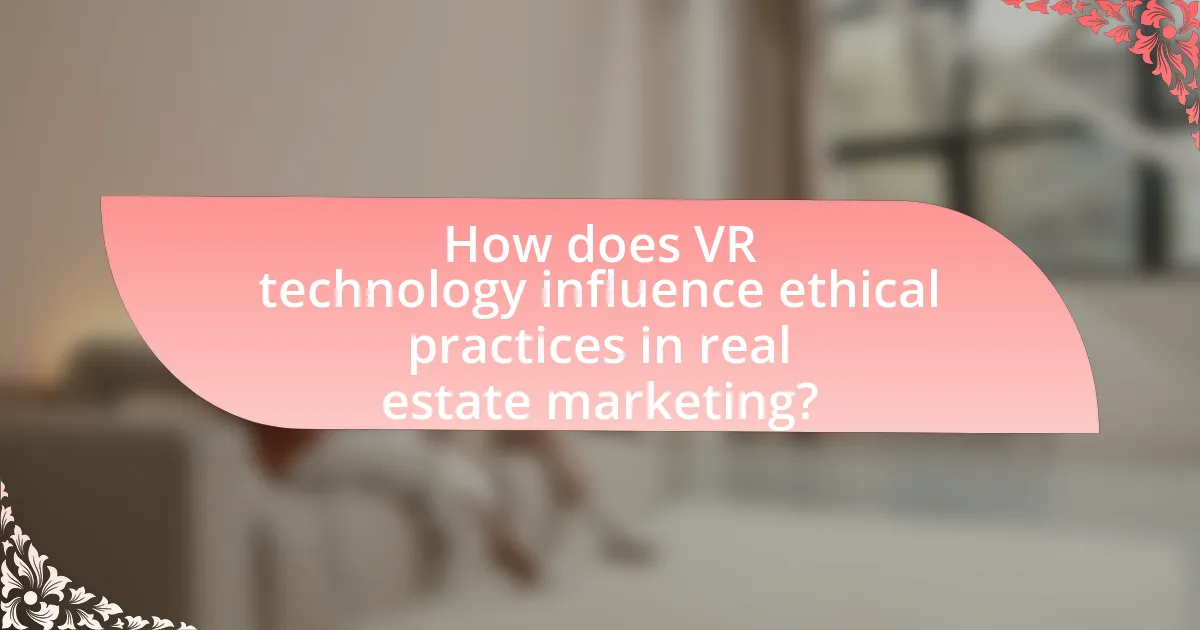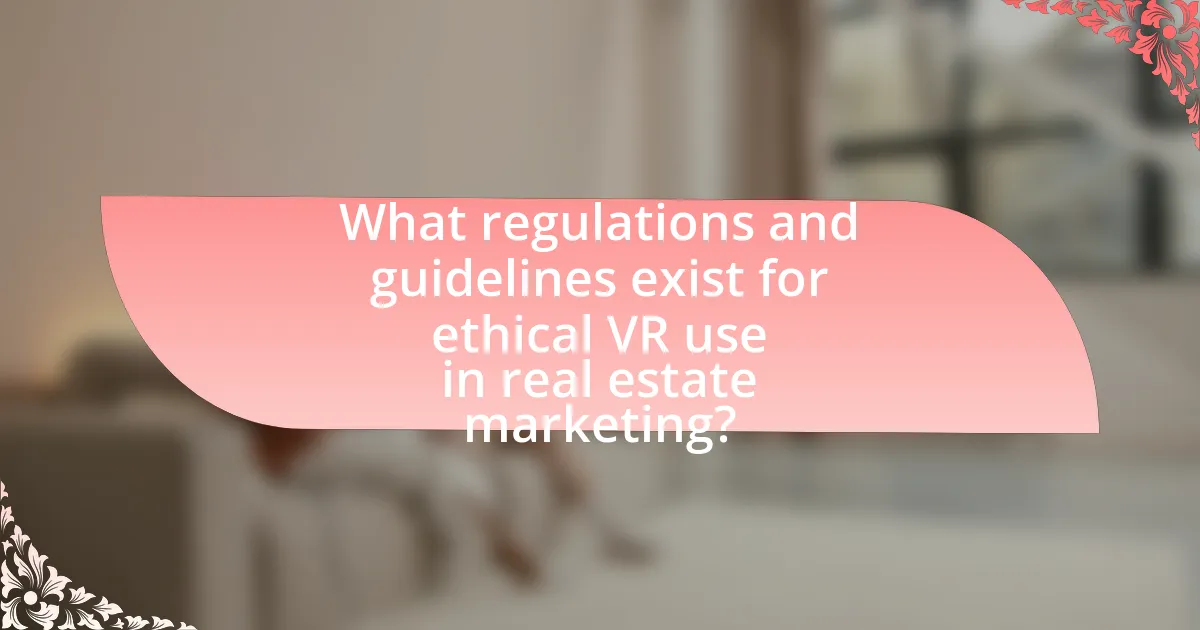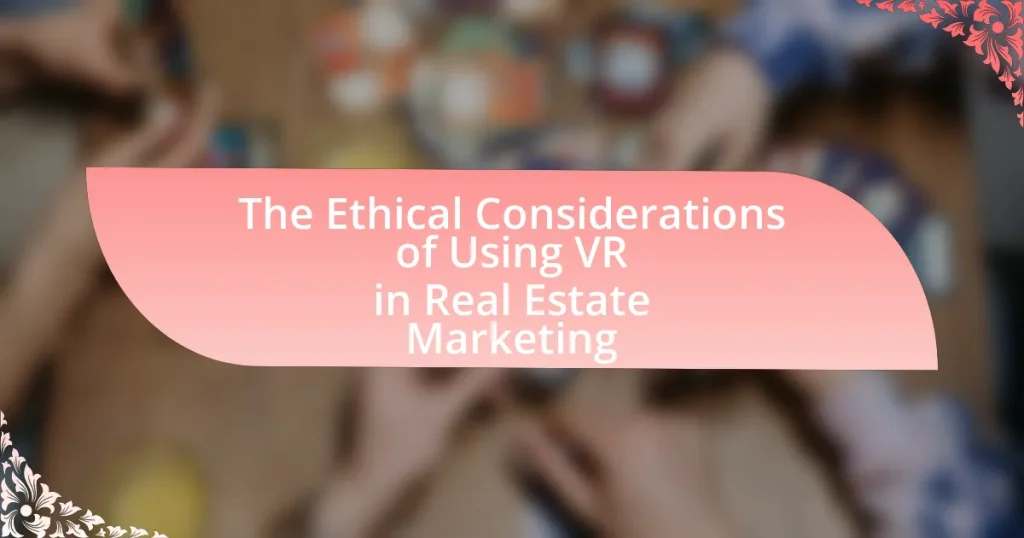The article focuses on the ethical considerations of using virtual reality (VR) in real estate marketing, highlighting issues such as transparency, consent, and misrepresentation. It emphasizes the importance of ethical practices to build consumer trust and protect rights, as well as the potential risks associated with VR, including the creation of unrealistic expectations. The article also discusses the regulatory frameworks that govern VR marketing, the role of consumer feedback in shaping ethical standards, and best practices for real estate professionals to ensure responsible use of VR technology. Additionally, it explores future trends that may influence ethical considerations in this evolving field.

What are the Ethical Considerations of Using VR in Real Estate Marketing?
The ethical considerations of using virtual reality (VR) in real estate marketing include issues of transparency, consent, and potential misrepresentation. Transparency is crucial as consumers must be aware that VR experiences may not accurately reflect the actual property, leading to possible disappointment or mistrust. Consent is also important, as individuals featured in VR content should agree to their likeness being used, ensuring respect for privacy rights. Additionally, misrepresentation can occur if VR is used to exaggerate property features or create unrealistic expectations, which can lead to ethical dilemmas regarding honesty in advertising. These considerations are supported by industry standards and guidelines that emphasize ethical marketing practices, such as the National Association of Realtors’ Code of Ethics, which advocates for truthful representation in real estate transactions.
Why is ethics important in real estate marketing with VR?
Ethics is crucial in real estate marketing with virtual reality (VR) because it ensures transparency, builds trust, and protects consumer rights. The use of VR can create highly immersive experiences that may misrepresent properties, leading to potential deception. Ethical practices, such as accurately depicting property features and disclosing limitations of VR representations, help maintain integrity in the marketing process. According to the National Association of Realtors, ethical standards in real estate promote fair treatment and foster a positive reputation for the industry, which is essential in a market increasingly reliant on advanced technologies like VR.
What ethical dilemmas arise from using VR in property marketing?
Using virtual reality (VR) in property marketing raises several ethical dilemmas, primarily related to misrepresentation and consumer manipulation. The immersive nature of VR can create an exaggerated perception of properties, leading potential buyers to form unrealistic expectations. For instance, a study by the National Association of Realtors found that 77% of buyers found VR tours helpful, but this can also lead to disappointment if the actual property does not match the VR experience. Additionally, there are concerns about privacy and data security, as VR platforms often collect user data that could be misused. These ethical issues highlight the need for transparency and honesty in VR marketing practices to protect consumers.
How do ethical considerations impact consumer trust in real estate?
Ethical considerations significantly impact consumer trust in real estate by influencing perceptions of transparency and integrity. When real estate professionals adhere to ethical standards, such as honesty in advertising and fair treatment of clients, they foster a sense of reliability and credibility. Research indicates that 70% of consumers are more likely to trust companies that demonstrate ethical behavior, as highlighted in the 2021 Edelman Trust Barometer. This trust is crucial in real estate transactions, where large financial commitments are involved, and consumers seek assurance that their interests are prioritized. Thus, ethical practices not only enhance consumer trust but also contribute to long-term relationships and repeat business in the real estate market.
What are the potential benefits of using VR in real estate marketing?
The potential benefits of using VR in real estate marketing include enhanced property visualization, increased engagement, and improved customer experience. VR allows potential buyers to take immersive virtual tours of properties, which can lead to a better understanding of the space and its features. According to a study by the National Association of Realtors, 77% of buyers found virtual tours to be helpful in their home search, indicating that VR can significantly influence purchasing decisions. Additionally, VR can save time for both agents and clients by streamlining the property viewing process, allowing clients to explore multiple listings without the need for physical visits.
How can VR enhance the buyer’s experience in real estate?
VR can enhance the buyer’s experience in real estate by providing immersive property tours that allow potential buyers to visualize spaces in a realistic manner. This technology enables users to explore properties remotely, offering a comprehensive understanding of layouts, dimensions, and design features without the need for physical visits. According to a study by the National Association of Realtors, 77% of buyers found virtual tours helpful in their home search, indicating that VR significantly influences decision-making by enhancing engagement and reducing uncertainty.
What advantages does VR offer to real estate agents and marketers?
Virtual Reality (VR) offers significant advantages to real estate agents and marketers by enhancing property visualization and improving client engagement. VR allows potential buyers to experience immersive property tours from anywhere, increasing accessibility and convenience. According to a study by the National Association of Realtors, 77% of buyers found virtual tours helpful in their home search, demonstrating that VR can effectively capture interest and facilitate decision-making. Additionally, VR can differentiate listings in a competitive market, as properties showcased with VR technology often attract more attention and can lead to faster sales.

How does VR technology influence ethical practices in real estate marketing?
VR technology enhances ethical practices in real estate marketing by providing immersive and accurate representations of properties, which reduces misleading information. This technology allows potential buyers to experience properties virtually, ensuring that they have a realistic understanding of the space, layout, and features before making a decision. According to a study by the National Association of Realtors, 77% of buyers found virtual tours helpful in their home search, indicating that VR can facilitate informed decision-making and transparency in the marketing process. By promoting honesty and clarity, VR technology helps to uphold ethical standards in real estate marketing.
What are the risks of misrepresentation in VR real estate marketing?
Misrepresentation in VR real estate marketing poses significant risks, including legal repercussions, loss of consumer trust, and financial liabilities. When properties are inaccurately depicted, buyers may make decisions based on misleading information, leading to potential lawsuits for false advertising or breach of contract. A study by the National Association of Realtors found that 87% of homebuyers consider accurate property representation crucial, indicating that misrepresentation can severely damage a brand’s reputation and customer relationships. Furthermore, financial losses can occur if buyers seek refunds or compensation for misrepresented properties, highlighting the importance of ethical practices in VR marketing.
How can VR create unrealistic expectations for buyers?
VR can create unrealistic expectations for buyers by presenting hyper-realistic simulations that exaggerate property features and spatial dimensions. These immersive experiences often showcase properties in idealized conditions, such as perfect lighting and staged furnishings, which can mislead potential buyers about the actual state and size of the property. Research indicates that 70% of consumers report feeling more positive about a property after a VR tour, yet this can lead to disappointment when the real-life experience does not match the virtual representation. This discrepancy can result in buyers making decisions based on inflated perceptions rather than factual assessments.
What measures can be taken to ensure accurate representation in VR?
To ensure accurate representation in virtual reality (VR), developers should implement rigorous content verification processes. This includes using high-resolution imagery and precise 3D modeling to reflect real-world properties accurately. Additionally, incorporating user feedback during the development phase can help identify discrepancies between the VR experience and actual properties. Research indicates that accurate visual representation can enhance user trust and satisfaction, as seen in a study by the National Association of Realtors, which found that 73% of buyers prefer properties with accurate virtual tours.
How does consumer perception affect ethical considerations in VR marketing?
Consumer perception significantly influences ethical considerations in VR marketing by shaping how consumers interpret and respond to virtual experiences. When consumers perceive VR marketing as authentic and transparent, they are more likely to trust the brand and engage positively, which aligns with ethical marketing practices. Conversely, if consumers view VR content as misleading or manipulative, it raises ethical concerns regarding deception and exploitation. Research indicates that 70% of consumers are more likely to support brands that demonstrate ethical marketing practices, highlighting the importance of aligning consumer perception with ethical standards in VR marketing strategies.
What role does transparency play in consumer trust with VR marketing?
Transparency is crucial in building consumer trust in VR marketing, particularly in real estate. When consumers perceive that a company is open about its practices, data usage, and the authenticity of virtual representations, they are more likely to engage positively with the brand. Research indicates that 94% of consumers are more likely to be loyal to a brand that offers complete transparency, as it fosters a sense of security and reliability. In the context of VR marketing, this means providing clear information about the technology used, the accuracy of virtual property representations, and how consumer data will be handled. By ensuring transparency, companies can mitigate skepticism and enhance consumer confidence, ultimately leading to higher conversion rates and customer satisfaction.
How can feedback from consumers shape ethical practices in VR real estate?
Feedback from consumers can significantly shape ethical practices in VR real estate by providing insights into user experiences and expectations. When consumers express concerns about misleading representations or privacy issues in virtual environments, real estate companies can adjust their practices to enhance transparency and accountability. For instance, a survey conducted by the National Association of Realtors found that 70% of homebuyers prefer accurate virtual representations of properties, indicating that consumer feedback directly influences the ethical standards that companies adopt. By actively listening to consumer feedback, real estate firms can implement ethical guidelines that prioritize honesty in marketing and protect user data, thereby fostering trust and integrity in the industry.

What regulations and guidelines exist for ethical VR use in real estate marketing?
Regulations and guidelines for ethical VR use in real estate marketing include adherence to the Federal Trade Commission (FTC) guidelines, which mandate truthfulness in advertising and prohibit deceptive practices. Additionally, the National Association of Realtors (NAR) emphasizes transparency and accuracy in property representations, urging real estate professionals to disclose when VR content has been digitally altered. Compliance with the General Data Protection Regulation (GDPR) is also crucial when collecting personal data through VR platforms, ensuring user consent and data protection. These regulations collectively aim to maintain integrity and trust in real estate marketing practices.
What legal frameworks govern the use of VR in real estate marketing?
The legal frameworks governing the use of virtual reality (VR) in real estate marketing primarily include intellectual property laws, consumer protection regulations, and privacy laws. Intellectual property laws protect the rights of creators of VR content, ensuring that original works are not used without permission. Consumer protection regulations require that marketing practices, including VR representations of properties, do not mislead potential buyers, adhering to truth-in-advertising standards. Privacy laws, such as the General Data Protection Regulation (GDPR) in Europe, mandate that any personal data collected during VR experiences must be handled in compliance with data protection principles. These frameworks collectively ensure that VR marketing practices are ethical and legally compliant, safeguarding both consumers and creators.
How do these regulations protect consumers from unethical practices?
Regulations protect consumers from unethical practices in real estate marketing by establishing standards for transparency and accountability. These regulations require real estate professionals to disclose accurate information about properties, ensuring that consumers are not misled by false representations or deceptive marketing tactics. For instance, the Federal Trade Commission enforces truth-in-advertising laws, which mandate that all claims made in marketing materials must be substantiated. This legal framework helps to prevent fraudulent activities, such as misrepresenting property features or omitting critical information, thereby safeguarding consumer interests and promoting fair competition in the market.
What are the consequences of failing to adhere to these regulations?
Failing to adhere to regulations in the context of using virtual reality (VR) in real estate marketing can lead to significant legal and financial consequences. Non-compliance may result in penalties such as fines, legal action from regulatory bodies, and potential lawsuits from consumers who feel misled by inaccurate representations. For instance, the Federal Trade Commission (FTC) enforces truth-in-advertising laws, which require that marketing claims be truthful and not misleading; violations can lead to substantial fines and damage to a company’s reputation. Additionally, failure to comply with privacy regulations, such as the General Data Protection Regulation (GDPR), can result in hefty fines and restrictions on business operations.
What best practices should real estate marketers follow when using VR?
Real estate marketers should prioritize transparency, user experience, and ethical representation when using virtual reality (VR). Transparency involves clearly communicating the capabilities and limitations of VR technology to potential clients, ensuring they understand what to expect. Enhancing user experience requires creating immersive, high-quality virtual tours that accurately reflect properties, allowing clients to visualize spaces effectively. Ethical representation mandates that marketers avoid misleading visuals or exaggerated features, adhering to industry standards and regulations to maintain trust. These practices not only foster credibility but also align with ethical marketing principles, ultimately benefiting both marketers and clients.
How can real estate professionals ensure ethical VR marketing strategies?
Real estate professionals can ensure ethical VR marketing strategies by adhering to transparency, accuracy, and respect for user privacy. Transparency involves clearly disclosing the use of VR technology and its purpose in marketing, allowing potential buyers to understand the immersive experience they are engaging with. Accuracy is crucial; professionals must ensure that the VR representations of properties are truthful and not misleading, reflecting the actual conditions and features of the properties. Respecting user privacy means obtaining consent before collecting any personal data during VR interactions and ensuring that such data is securely handled. These practices align with ethical standards in marketing and help build trust with clients, ultimately fostering a responsible approach to VR technology in real estate.
What tools and resources are available to promote ethical VR practices?
Tools and resources available to promote ethical VR practices include guidelines from organizations like the Virtual Reality Developers Association (VRDA), which provides ethical frameworks for developers. Additionally, the IEEE Global Initiative on Ethics of Autonomous and Intelligent Systems offers standards and best practices for ethical technology use, including VR. Research studies, such as “Ethics in Virtual Reality: A Review” by authors from Stanford University, highlight the importance of ethical considerations in VR applications. Furthermore, online platforms like the VR Ethics Forum facilitate discussions and share resources among professionals to ensure responsible VR development and usage.
What future trends may influence ethical considerations in VR real estate marketing?
Future trends such as advancements in AI, increased regulatory scrutiny, and the rise of consumer awareness regarding data privacy will significantly influence ethical considerations in VR real estate marketing. As AI technology evolves, it may enable more personalized marketing strategies, raising concerns about manipulation and consumer autonomy. Additionally, regulatory bodies are likely to implement stricter guidelines to ensure transparency and fairness in advertising practices, particularly as VR becomes more mainstream. Furthermore, heightened consumer awareness about data privacy will compel real estate marketers to adopt ethical data handling practices, ensuring that user consent and data security are prioritized. These trends collectively underscore the need for ethical frameworks that balance innovation with consumer protection in VR real estate marketing.
How might advancements in VR technology impact ethical standards?
Advancements in VR technology may significantly impact ethical standards by enhancing the realism and immersion of virtual experiences, which can lead to potential misrepresentation in real estate marketing. As VR becomes more sophisticated, it allows for hyper-realistic simulations of properties, which could mislead potential buyers regarding the actual condition or features of a property. For instance, a study by the National Association of Realtors indicates that 77% of buyers found virtual tours helpful, but this also raises concerns about the authenticity of the representations being made. Consequently, ethical standards may need to evolve to ensure transparency and accuracy in VR marketing practices, requiring real estate professionals to disclose when VR content has been altered or enhanced.
What role will consumer advocacy play in shaping the future of VR marketing ethics?
Consumer advocacy will play a crucial role in shaping the future of VR marketing ethics by ensuring that consumer rights and interests are prioritized in the development and implementation of VR technologies. As VR marketing becomes more prevalent in real estate, consumer advocates will push for transparency, informed consent, and protection against misleading representations. For instance, organizations like the Consumer Federation of America have historically influenced regulations by highlighting consumer concerns, which can lead to stricter ethical guidelines in VR marketing practices. This advocacy will help establish standards that protect consumers from potential exploitation and ensure that VR marketing remains a trustworthy tool in real estate.


